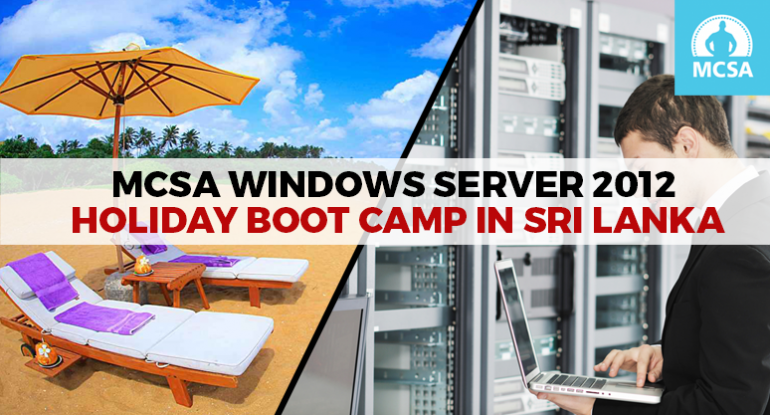- Home
- Database
- Networking
- Programming
- Online Courses
- Mobile Application
- Web App Developments
- Cryptocurrency Wallets and Mining Coins
- Q# Programming
- BlockChain Application Development
- Java Servlet Programming
- Java Training with Spring
- Developing Images with Docker
- C++ Training
- Python RPA Programming
- Excel VBA Training
- Ruby on Rails Training
- C# Training Course
- Testing
- Automation Test Engineer
- Penetration Testing
- Cucumber BDD
- Selenium Web Test Training Java
- Selenium Test Automation with PHP
- Selenium Test Automation with C# .NET and NUnit
- Android Appium Test Automation
- Online Performance Testing
- Python Automation Testing with Selenium and BDD
- Automation Test Architect
- Automation Test Analyst
- SpecFlow Automation Testing
- Contact
- About Us
MCSA Windows Server 2012 Boot Camp
DESCRIPTION
MCSA: Windows Server 2012 holiday boot camp creates a golden opportunity to you to enhance your hands-on skills and facilitates the environment to prepare for the MCSA: Windows server 2012 certification exams. This boot camp is well designed targeting to carry out lectures based on Microsoft learning recommended content as well as twelve months of access to over 35 hands-on remote labs. This will be proceeded by quite experienced senior instructors in London Westminster College.
All the exam vouchers necessary for the certification along with one free retake voucher which can be used if on need, are issued in this boot camp. This helps to access to our Microsoft Boot Camp exclusively providing indispensable preparation for the exam to get the certification.
You Will Prepare for These Exams:
- 70-410: Installing and Configuring Windows Server 2012
- 70-411: Administering Windows Server 2012
- 70-412: Configuring Advanced Windows Server 2012 Services
PREREQUISITES
- You should have at least two years of hands-on working experience in a Windows Server 2008 or Windows Server 2012 environment
- It is recommended to the clients to have hands-on experience with Windows Vista, Windows 7, or Windows 8
commencing date
- 29th April 2017 to 6th May 2017 (8 Days)

Day 1– Airport pick up and stay at hotel
The clients who willingly appear to attend the holidays boot camp will be warmly received from the airport and necessary facilities will be arranged to stay in a hotel with at most safety and comfortable. You can take rest and spend your time there leisurely.

Day 2 – Training
You will be given the basic hands-on classroom and lab training in an understandable way and facilitated to adopt the environment to proceed the boot camp usefully.

Day 3 – Day out
You will be entertained and motivated to continue the boot camp effectively through the whole day trip on this day. You will be taken to a place near to your boot camp to squander your time leisurely.

Day 4 – Training
Training program will be continued to improve your hands-on skills and experiences to face MCSA: Windows Server 2012 exam successfully.

Day 5 – Training
Final part of the training will be given elboratively facilitating you to get ready for MCSA: Windows Server 2012 exam confidently.

Day 6 – Traveling to Colombo
You will travel to Colombo to sit for the exam viewing the rustic beauty of the places on your way.

Day 7 – Exam
You can attend your MCSA: Windows Server 2012 exam in Sri Lanka as soon as you finish your proper training here.

Day 8 – Check out from airport
After facing the exam, you can check out from the airport happily and leave the place with satisfaction that you have done the exam properly.
- The ability to administer the infrastructure of a Windows Server 2012 in an enterprise environment confidently
- The process to implement and configure the core services of Windows Server 2012 such as Active Directory and networking services
- The administration tasks including user and group management, network access and data security to maintain the infrastructure of a Window Server 2012
- Advanced configuration tasks such as fault tolerance, certificate services and identity federation required to arrange, manage and maintain the infrastructure of a Windows Server
- Key topics, concepts and contents of MCSA: Windows Server 2012 exams
- IT professionals who should have at least two years of hands-on experience in implementing and administering network and desktop operating systems
- Systems engineers, network engineers, systems analysts, network analysts, and technical consultants who are preferred to prepare for MCSA: Windows Server 2012 exams and to attain credentials as soon as possible with well-established recognition
- Clients who wants to attend MCSAs on Windows Server 2008
Exam 70-410: Installing and Configuring Windows Server 2012
1: Deploying and Managing Windows Server 2012
- Windows Server 2012
- Windows Server 2012 Management
- Installing Windows Server 2012
- Post-Installation Configuration of Windows Server 2012
- Windows PowerShell
2: Active Directory Domain Services (AD DS)
- AD DS
- Domain Controllers
- Installing a Domain Controller
3: Managing Active Directory Domain Services Objects
- Managing User Accounts
- Managing Group Accounts
- Managing Computer Accounts
- Delegating Administration
4: Automating AD DS Administration
- Using Command Line Tools for Administration
- Using Windows PowerShell for Administration
- Performing Bulk Operations with Windows PowerShell
5: Implementing IPv4
- TCP/IP
- IPv4 Addressing
- Subnetting and Supernetting
- Configuring and Troubleshooting IPv4
6: Implementing Dynamic Host Configuration Protocol (DHCP)
- Installing a DHCP Server Role
- Configuring DHCP Scopes
- Managing a DHCP Database
- Securing and Monitoring DHCP
7: Implementing Domain Name System (DNS)
- Name Resolution for Windows Clients and Servers
- Installing and Managing a DNS Server
- Managing DNS Zones
8: Implementing IPv6
- IPv6 Addressing
- Coexistence with IPv6
- IPv6 Transition Technologies
9: Implementing Local Storage
- Storage
- Managing Disks and Volumes
- Implementing Storage Spaces
10: Implementing File and Print Services
- Securing Files and Folders
- Protecting Shared Files and Folders Using Shadow Copies
- Configuring Network Printing
11: Implementing Group Policy
- Group Policy Processing
- Implementing a Central Store for Administrative Templates
12: Securing Windows Servers Using Group Policy Objects
- Windows Security
- Configuring Security Settings
- Restricting Software
- Configuring Windows Firewall with Advanced Security
13: Implementing Server Virtualization with Hyper-V
- Virtualization Technologies
- Implementing Hyper-V
- Managing Virtual Machine Storage
- Managing Virtual Networks
Exam 70-411: Administering Windows Server 2012
1: Implementing a Group Policy Infrastructure
- Group Policy
- Implementing and Administering Group Policy Objects (GPOs)
- Managing Group Policy Scope
- Group Policy Processing
- Troubleshooting the Application of GPOs
2: Managing User Desktops with Group Policy
- Implementing Administrative Templates
- Configuring Folder Redirection and Scripts
- Configuring Group Policy Preferences
- Managing Software with Group Policy
3: Managing User and Service Accounts
- Automating User Account Management
- Configuring Password-Policy and User-Account Lockout
- Configuring Managed Service Accounts
4: Maintaining Active Directory Domain Services
- Implementing Virtualized Domain Controllers
- Implementing Read-Only Domain Controllers
- Administering AD DS
- Managing the AD DS Database
5: Configuring and Troubleshooting Domain Name System (DNS)
- Installing the DNS Server Role
- Configuring the DNS Server Role
- Configuring DNS Zones
- Configuring DNS Zone Transfers
- Managing and Troubleshooting DNS
6: Configuring and Troubleshooting Remote Access
- Configuring Network Access
- Configuring VPN Access
- Network Policies
- Troubleshooting Routing and Remote Access
- Configuring DirectAccess
7: Installing, Configuring, and Troubleshooting the Network Policy Server Role
- Installing and Configuring a Network Policy Server
- Configuring RADIUS Clients and Servers
- NPS Authentication Methods
- Monitoring and Troubleshooting a Network Policy Server
8: Implementing Network Access Protection
- NAP Enforcement Processes
- Configuring NAP
- Monitoring and Troubleshooting NAP
9: Optimizing File Services
- File Server Resource Manager (FSRM)
- Using FSRM to Manage Quotas, File Screens, and Storage Reports
- Implementing Classification and File Management Tasks
- Distributed File System (DFS)
- Configuring DFS Namespaces
- Configuring and Troubleshooting DFS-R
10: Configuring Encryption and Advanced Auditing
- Encrypting Files Using Encrypting File System
- Configuring Advanced Auditing
11: Deploying and Maintaining Server Images
- Windows Deployment Services
- Implementing Deployment with Windows Deployment Services
- Administering Windows Deployment Services
12: Implementing Update Management
- Windows Server Update Services (WSUS)
- Deploying Updates with WSUS
13: Monitoring Windows Server 2012
- Monitoring Tools
- Using Performance Monitor
- Monitoring Event Logs
Exam 70-412: Configuring Advanced Windows Server 2012 Services
1: Implementing Advanced Network Services
- Configuring Advanced DHCP Features
- Configuring Advanced DNS Settings
- Implementing IPAM
2: Implementing Advanced File Services
- Configuring iSCSI Storage
- Configuring BranchCache
- Optimizing Storage Usage
3: Implementing Dynamic Access Control
- Planning for Dynamic Access Control
- Deploying Dynamic Access Control
4: Implementing Network Load Balancing (NLB)
- Configuring an NLB Cluster
- Planning an NLB Implementation
5: Implementing Failover Clustering
- Implementing a Failover Cluster
- Configuring Highly Available Applications and Services on a Failover Cluster
- Maintaining a Failover Cluster
- Implementing a Multi-Site Failover Cluster
6: Implementing Failover Clustering with Hyper-V
- Integrating Hyper-V with Failover Clustering
- Implementing Hyper-V Virtual Machines on Failover Clusters
- Implementing Hyper-V Vi rtual Machine Movement
- Managing Hyper-V Virtual Environments by Using VMM
7: Implementing Disaster Recovery
- Implementing Windows Server Backup
- Implementing Server and Data Recovery
- Restore
8: Implementing Distributed AD DS Deployments
- Deploying a Distributed AD DS Environment
- Configuring AD DS Trusts
9: Implementing AD DS Sites and Replication
- Configuring AD DS Sites
- Configuring and Monitoring AD DS Replication
10: Implementing Active Directory Certificate Services
- Public Key Infrastructure (PKI)
- Deploying CAs
- Deploying and Managing Certificate Templates
- Implementing Certificate Distribution and Revocation
- Managing Certificate Recovery
11: Implementing Active Directory Rights Management Services (AD RMS)
- Deploying and Managing an AD RMS Infrastructure
- Configuring AD RMS Content Protection
- Configuring External Access to AD RMS
12: Implementing Active Directory Federation Services (AD FS)
- Deploying AD FS
- Implementing AD FS for a Single Organization
- Deploying AD FS in a B2B Federation Scenario
Exam 70-410: Installing and Configuring Windows Server 2012
Lab 1: Deploy and Manage Windows Server 2012
Lab 2: Install Domain Controllers
Lab 3: Manage Active Directory Domain Services Objects
Lab 4: Automate AD DS Administration Using Windows PowerShell
Lab 5: Implement IPv4
Lab 6: Implement DHCP
Lab 7: Implement DNS
Lab 8: Implement IPv6
Lab 9: Implement Local Storage
Lab 10: Implement File and Print Services
Lab 11: Implement Group Policy
Lab 12a: Increase Security for Server Resources
Lab 12b: Configure AppLocker and Windows Firewall
Lab13: Implement Server Virtualization with Hyper-V
Exam 70-411: Administering Windows Server 2012
Lab 1: Implement a Group Policy Infrastructure
Lab 2: Manage User Desktops with Group Policy
Lab 3: Manage User and Service Accounts
Lab 4: Maintain AD DS
Lab 5: Configure and Troubleshoot DNS
Lab 6a: Configure Remote Access
Lab 6b: Configure DirectAccess
Lab 7: Install and Configure a Network Policy Server
Lab 8: Implement NAP
Lab 9a: Configure Quotas and File Screening Using FSRM
Lab 9b: Implement DFS
Lab 10: Configure Encryption and Advanced Auditing
Lab 11: Use Windows Deployment Services to Deploy Windows Server 2012
Lab 12: Implement Update Management
Lab 13: Monitor Windows Server 2012
Exam 70-412: Configuring Advanced Windows Server 2012 Services
Lab 1: Implement Advanced Network Services
Lab 2a: Implement Advanced File Services
Lab 2b: Implement BranchCache
Lab 3: Implement Dynamic Access Control
Lab 4: Implement Network Load Balancing
Lab 5: Implement Failover Clustering
Lab 6: Implement Failover Clustering with Hyper-V
Lab 7: Implement Windows Server Backup and
Lab 8: Implement Complex AD DS Deployments
Lab 9: Implement AD DS Sites and Replication
Lab 10: Implement Active Directory Certificate Services
Lab 11: Configure AD RMS
Lab 12: Implement AD FS


Reviews
There are no reviews yet.